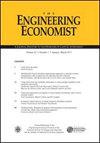Optimizing the flexible design of hybrid renewable energy systems
IF 1.2
4区 经济学
Q4 BUSINESS
引用次数: 0
Abstract
Abstract Engineering systems often operate for a long period of time under varying conditions. The system should be designed based on the best available information at the time of the decision. Designers should also account for future uncertainties in the initial design of the system. The initial design may or may not change as the future evolves and conditions change. The goal of this study is to optimize the design of a hybrid renewable energy system (HRES) to deliver electricity under highly uncertain demand. This research explores designing the hybrid system while taking into account uncertainties over a long period of time (i.e., 20 years in this study). The objective is to minimize the expected discounted cost of the HRES during the next 20 years. A design solution may also be flexible, which means that the design can be adapted or modified in the future to meet new scenarios. This article incorporates flexibility or capacity expansion into engineering design under long-range uncertainty when the objective function is evaluated via a Monte Carlo simulation. The value of expanding capacity is measured by comparing the cost without capacity expansion and cost with capacity expansion.优化混合可再生能源系统的柔性设计
工程系统经常在各种条件下长时间运行。该制度的设计应以作出决定时可获得的最佳资料为基础。设计者还应该在系统的初始设计中考虑到未来的不确定性。最初的设计可能会随着未来的发展和条件的变化而改变,也可能不会。本研究的目标是优化混合可再生能源系统(HRES)的设计,以在高度不确定的需求下提供电力。本研究探索在设计混合系统的同时考虑到长时间(即本研究中为20年)的不确定性。目标是在未来20年内将HRES的预期贴现成本降至最低。设计解决方案也可以是灵活的,这意味着设计可以在将来进行调整或修改以满足新的场景。本文通过蒙特卡罗模拟对目标函数进行评估时,将灵活性或能力扩展纳入到长期不确定性条件下的工程设计中。通过比较不扩容成本和扩容成本来衡量扩容的价值。
本文章由计算机程序翻译,如有差异,请以英文原文为准。
求助全文
约1分钟内获得全文
求助全文
来源期刊

Engineering Economist
ENGINEERING, INDUSTRIAL-OPERATIONS RESEARCH & MANAGEMENT SCIENCE
CiteScore
2.00
自引率
0.00%
发文量
14
审稿时长
>12 weeks
期刊介绍:
The Engineering Economist is a refereed journal published jointly by the Engineering Economy Division of the American Society of Engineering Education (ASEE) and the Institute of Industrial and Systems Engineers (IISE). The journal publishes articles, case studies, surveys, and book and software reviews that represent original research, current practice, and teaching involving problems of capital investment.
The journal seeks submissions in a number of areas, including, but not limited to: capital investment analysis, financial risk management, cost estimation and accounting, cost of capital, design economics, economic decision analysis, engineering economy education, research and development, and the analysis of public policy when it is relevant to the economic investment decisions made by engineers and technology managers.
 求助内容:
求助内容: 应助结果提醒方式:
应助结果提醒方式:


